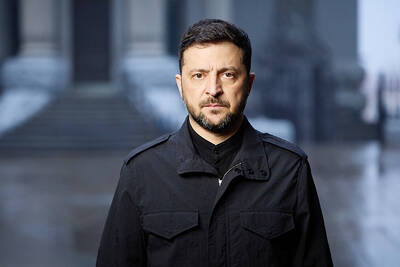The campaign team of Viktor Yanukovych, the loser of the Dec. 26 presidential vote, filed its appeal of the election results with the Supreme Court yesterday.
The court, along with Ukraine's election commission, has already rejected an array of appeals from Yanukovych's team, and the new complaint of some 621 volumes of documents and 233 videotapes is the campaign's last attempt at overturning the election won by pro-Western reformer Viktor Yushchenko.
Campaign manager Taras Chornovyl said that the voluminous appeal, delivered in a minivan, urges the court to "order a revote."
"We believe we can win," Chornovyl told reporters.
Nestor Shufrich, Yanukovych's representative on the Central Election Commission, filed the complaint along with other members of the losing candidate's team.
Natalya Sarapyn, a court spokeswoman, confirmed "the arrival of the complaint of several hundred volumes."
"At the moment, the appeal is with the registrar, where it is undergoing appropriate procedures," she said.
Yushchenko was officially declared the winner on Monday, but cannot be inaugurated until the Supreme Court reviews complaints from his rival. The Dec. 26 election was a rerun of Nov. 21 fraudulent balloting in which Yanukovych was declared the winner.

DISASTER: The Bangladesh Meteorological Department recorded a magnitude 5.7 and tremors reached as far as Kolkata, India, more than 300km away from the epicenter A powerful earthquake struck Bangladesh yesterday outside the crowded capital, Dhaka, killing at least five people and injuring about a hundred, the government said. The magnitude 5.5 quake struck at 10:38am near Narsingdi, Bangladesh, about 33km from Dhaka, the US Geological Survey (USGS) said. The earthquake sparked fear and chaos with many in the Muslim-majority nation of 170 million people at home on their day off. AFP reporters in Dhaka said they saw people weeping in the streets while others appeared shocked. Bangladesh Interim Leader Muhammad Yunus expressed his “deep shock and sorrow over the news of casualties in various districts.” At least five people,

It is one of the world’s most famous unsolved codes whose answer could sell for a fortune — but two US friends say they have already found the secret hidden by Kryptos. The S-shaped copper sculpture has baffled cryptography enthusiasts since its 1990 installation on the grounds of the CIA headquarters in Virginia, with three of its four messages deciphered so far. Yet K4, the final passage, has kept codebreakers scratching their heads. Sculptor Jim Sanborn, 80, has been so overwhelmed by guesses that he started charging US$50 for each response. Sanborn in August announced he would auction the 97-character solution to K4

SHOW OF FORCE: The US has held nine multilateral drills near Guam in the past four months, which Australia said was important to deter coercion in the region Five Chinese research vessels, including ships used for space and missile tracking and underwater mapping, were active in the northwest Pacific last month, as the US stepped up military exercises, data compiled by a Guam-based group shows. Rapid militarization in the northern Pacific gets insufficient attention, the Pacific Center for Island Security said, adding that it makes island populations a potential target in any great-power conflict. “If you look at the number of US and bilateral and multilateral exercises, there is a lot of activity,” Leland Bettis, the director of the group that seeks to flag regional security risks, said in an

‘DIGNITY’: The Ukrainian president said that ‘we did not not betray Ukraine then, we will not do so now,’ amid US pressure to give significant concessions to Russia Ukrainian President Volodymyr Zelenskiy on Friday pushed back against a US plan to end the war in Ukraine, while Russian President Vladimir Putin welcomed the proposal that includes many of his hardline demands. With US President Donald Trump giving Ukraine less than a week to sign, Zelenskiy pledged to work to ensure any deal would not “betray” Ukraine’s interests, while acknowledging he risked losing Washington as an ally. Putin said the blueprint could “lay the foundation” for a final peace settlement, but threatened more land seizures if Ukraine walked away from negotiations. Ukraine faces one of the most challenging moments in its history,